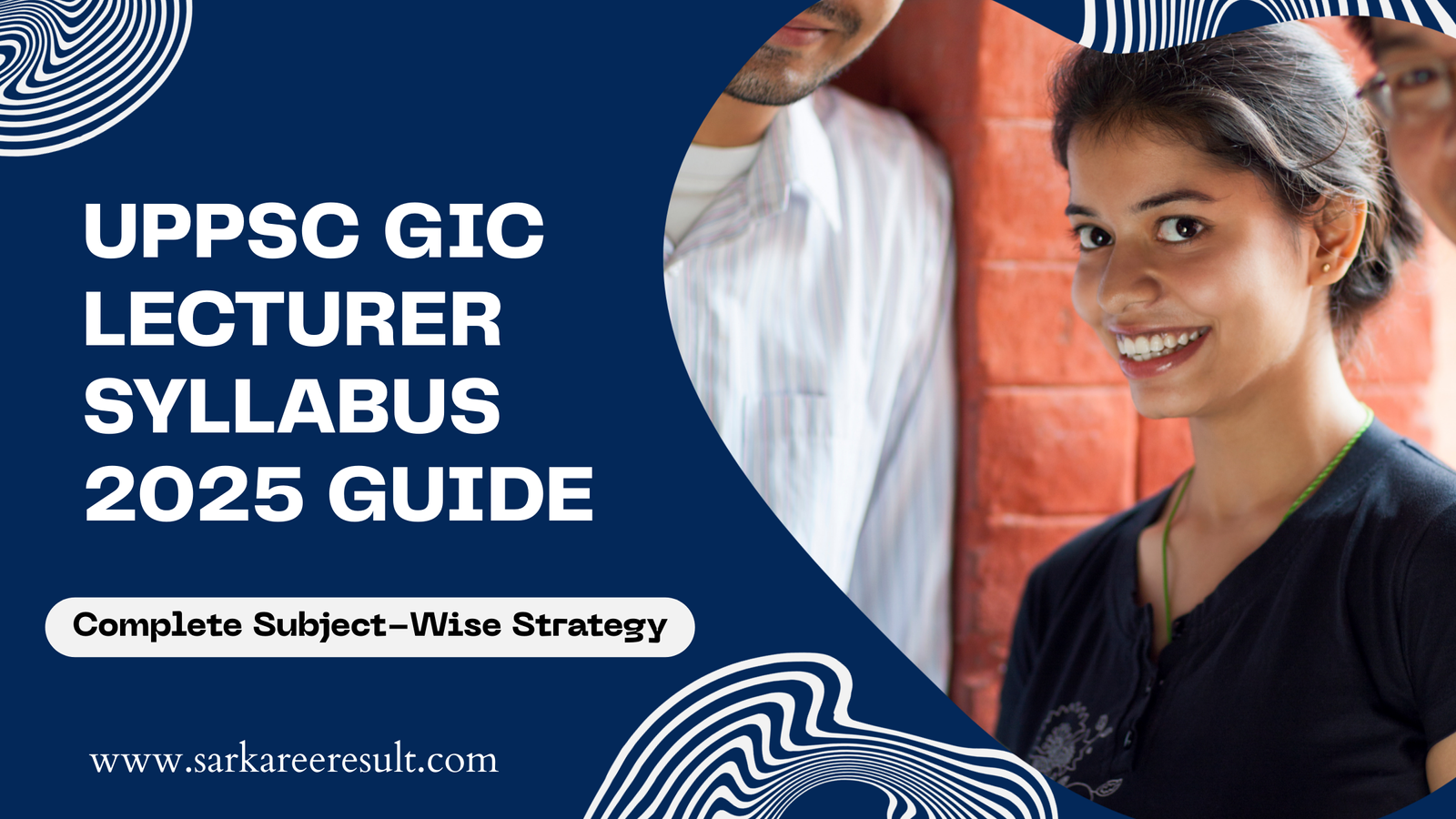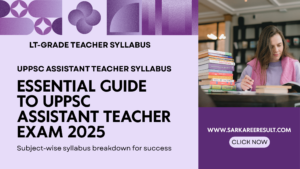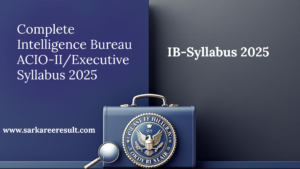UPPSC GIC Lecturer Recruitment Syllabus 2025
Complete Subject-Wise Guide for Preliminary and Mains Examination
The Uttar Pradesh Public Service Commission (UPPSC) has released the comprehensive syllabus for the UPPSC GIC Lecturer Recruitment 2025. This detailed guide covers both Preliminary and Main examination syllabi for all subjects to help candidates prepare effectively for this prestigious teaching position.
Examination Pattern Overview
Preliminary Examination Pattern
- Type: Objective (Multiple Choice Questions)
- Duration: 2 Hours
- Total Marks: 300
- Questions: 120 (40 General Studies + 80 Optional Subject)
- Marking Scheme: 2.5 marks per question
- Negative Marking: 1/3 marks deducted for wrong answers
Main Examination Pattern
- Total Papers: 3
- Paper 1: General Hindi & Essay (100 marks, 2 hours)
- Paper 2: Optional Subject (300 marks, 3 hours)
- Type: Descriptive (Traditional)
PRELIMINARY EXAMINATION SYLLABUS
General Studies (40 Questions – 100 Marks)
- General Science (High School Standard)
- History of India
- Indian National Movement
- Indian Polity, Economy & Culture
- Indian Agriculture, Commerce & Trade
- World Geography & Indian Geography & Natural Resources of India
- Current National and International Important Events
- Logic & Reasoning based on General Intelligence
- Specific Knowledge regarding Education, Culture, Agriculture, Industry Trade, Living & Social Traditions of Uttar Pradesh
- Elementary Mathematics up to 8th level: Arithmetic, Algebra and Geometry
- Ecology and Environment
Optional Subject (80 Questions – 200 Marks)
The syllabus for optional subjects in preliminary examination follows the same pattern as the main examination but in objective format.
MAIN EXAMINATION SYLLABUS
Paper 1: General Hindi & Essay (100 Marks)
Section A: General Hindi (50 Marks)
- Unseen Passage: Comprehension, related questions, explanation of underlined portions, and appropriate title
- Vocabulary: Synonyms, antonyms, homonyms, tatsam-tadbhav, regional/foreign words, spelling, word meaning
- Grammar: Word forms, sandhi, samas, verbs, Hindi alphabet, punctuation marks, sentence construction
- Idioms and Proverbs
- Major dialects of Uttar Pradesh and common errors in Hindi language usage
Section B: Hindi Essay (50 Marks)
Word Limit: Maximum 1000 words
Topics Include:
- Literature and Culture
- National Development Plans/Implementation
- National-International contemporary social problems/solutions
- Science and Environment
- Natural disasters and their prevention
- Agriculture, Industry and Trade
SUBJECT-WISE DETAILED SYLLABUS FOR MAIN EXAMINATION
1. HINDI LITERATURE
History of Hindi Literature
- Tradition of Hindi literary history writing
- Period division: Adikal, Bhaktikal, Ritikal, Modern period
- Major poets and their works from different periods
- Famous poetry lines and their authors
Prose Literature Development
- Essay, novel, story, drama, criticism
- New genres: Biography, autobiography, memoirs, sketches, reportage, travel literature
- Major Hindi magazines, publication places, and editors
Indian Poetics
- Poetry definition and types, Rasa, Chhanda, Alankara
- Poetry schools and periods, poetry defects, word powers
Linguistics
- Hindi dialects, sub-dialects, Hindi sounds, Hindi vocabulary
- Sandhi, samas, karak, gender, number, tense, synonyms, antonyms
Sanskrit Literature
- Major Sanskrit authors: Kalidas, Bhavabhuti, Bharavi, Magh, Bhas, etc.
- Sanskrit grammar: Sandhi, samas, prefix, suffix, case signs, word forms, verb forms
2. ENGLISH LITERATURE
Section A: Authors and Literary Works
Major Authors: Geoffrey Chaucer, Shakespeare, John Milton, William Wordsworth, P.B. Shelley, John Keats, T.S. Eliot, G.B. Shaw, Charles Dickens, Thomas Hardy, etc.
Literary Terms and Movements
- Renaissance, Reformation, Metaphysical Poetry, Classicism, Romanticism
- Modern Literature, Post-Modern Literature, Colonial Literature
- Major stanza forms: Sonnet, Ballad, Mock Epic, Elegy
- Literary Critics: Aristotle, Dryden, Dr. Johnson, S.T. Coleridge, Matthew Arnold
Section B: Language Skills
- Comprehension passage, sentence correction
- Direct/Indirect narration, Active/Passive voice transformation
- Synonyms, antonyms, idioms & phrases, one word substitution
- Figures of speech, prefixes & suffixes
3. PHYSICS
Mechanics
- Vector algebra, center of mass, rotating frames, moment of inertia
- Angular momentum, torque, central forces, Kepler’s laws
- Special theory of relativity, Lorentz transformations
Thermal Physics
- Laws of thermodynamics, entropy, Carnot cycle
- Kinetic theory of gases, Maxwell distribution
- Black body radiation, Stefan’s law, Planck’s law
Waves and Oscillations
- Simple harmonic motion, wave equations
- Fourier analysis, phase and group velocities
Optics
- Interference, diffraction, polarization
- Laser principles, temporal and spatial coherence
Electricity and Magnetism
- Gauss law, electromagnetic induction
- Maxwell’s equations, electromagnetic waves
- Magnetic properties of materials
Modern Physics
- Quantum mechanics, atomic structure
- Nuclear physics, elementary particles
- Band theory of solids
4. CHEMISTRY
Physical Chemistry
- Gaseous state, thermodynamics, chemical kinetics
- Chemical equilibrium, electrochemistry
- Surface phenomena, dilute solutions
Inorganic Chemistry
- Atomic structure, periodic properties, chemical bonding
- s-block, p-block, d-block, f-block elements
- Coordination compounds, organometallic chemistry
Organic Chemistry
- Basic principles, isomerism, hydrocarbons
- Functional groups: alcohols, aldehydes, ketones, carboxylic acids
- Biomolecules: carbohydrates, proteins, lipids, nucleic acids
- Polymers, chemistry in everyday life
5. BIOLOGY
Botany Section
- Plant Diversity: Classification, algae, bryophyta, pteridophyta, gymnosperms, angiosperms
- Plant Physiology: Photosynthesis, respiration, plant nutrition, growth regulators
- Microbiology: Viruses, bacteria, fungi and their economic importance
- Economic Botany: Medicinal plants, food plants, fiber crops
- Plant Pathology: Plant diseases, biological control methods
- Ecology: Ecosystem, biodiversity, environmental pollution
Zoology Section
- Animal Diversity: Non-chordates, chordates classification
- Animal Physiology: Nutrition, circulation, excretion, nervous coordination
- Cell Biology: Cell structure, cell division, nucleic acids
- Genetics: Mendel’s laws, chromosomal theory, mutations
- Biotechnology: Recombinant DNA technology, genetic engineering
- Evolution: Theories of evolution, evidences, human evolution
6. MATHEMATICS
Algebra
- Relations and functions, matrices, determinants
- Theory of equations, progressions, permutations and combinations
- Binomial theorem, probability
Calculus
- Limits, continuity, differentiation, integration
- Differential equations, applications of derivatives and integrals
Coordinate Geometry
- Straight lines, circles, parabola, ellipse, hyperbola
- Vector geometry, three-dimensional geometry
Abstract Algebra
- Groups, rings, fields, linear algebra
- Vector spaces, linear transformations
7. GEOGRAPHY
Physical Geography
- Earth’s structure, plate tectonics, volcanoes, earthquakes
- Climate, weather patterns, ocean currents
- Ecosystem, environmental issues
Human Geography
- Population geography, settlements, cultural geography
- Economic geography, agricultural and industrial regions
Regional Geography
- World regions, developed and developing countries
- India’s geography: relief, climate, natural resources
8. HISTORY
Ancient India
- Prehistoric cultures, Indus Valley Civilization
- Vedic culture, Mauryan and Gupta empires
- Regional kingdoms, art and architecture
Medieval India
- Delhi Sultanate, Mughal Empire
- Administration, culture, and society
- Regional states, Maratha power
Modern India
- British colonial rule, freedom struggle
- Social and religious reforms
- Constitutional developments
9. ECONOMICS
Microeconomics
- Consumer behavior, demand analysis, production theory
- Market structures, pricing under different markets
Macroeconomics
- National income, employment theories, inflation
- Trade cycles, fiscal and monetary policies
Indian Economy
- Planning in India, poverty and unemployment
- Agricultural and industrial policies
- Public finance, international trade
10. POLITICAL SCIENCE (CIVICS)
Political Theory
- State, sovereignty, rights, justice, equality
- Democracy, political parties, public opinion
Indian Government
- Constitutional framework, federalism
- Executive, legislature, judiciary
- Local government, Panchayati Raj
International Relations
- Foreign policy, international organizations
- Regional cooperation, global issues
11. SOCIOLOGY
Sociological Concepts
- Society, community, association, social groups
- Social processes, stratification, mobility
Social Thinkers
- Auguste Comte, Karl Marx, Max Weber, Durkheim
- Indian sociologists: M.N. Srinivas, G.S. Ghurye
Indian Society
- Caste system, family, marriage, kinship
- Social problems: poverty, unemployment, corruption
12. SANSKRIT
Vedic Literature
- Rigveda hymns, Upanishads, Vedangas
- Philosophical schools: Sankhya, Vedanta, Nyaya
Classical Literature
- Mahakavyas: Ramayana, Mahabharata
- Classical poetry and drama
- Puranas and their significance
Grammar
- Laghu Siddhanta Kaumudi, Siddhanta Kaumudi
- Sandhi, declensions, conjugations
- Voice transformations
13. URDU
Urdu Literature History
- Development in Deccan and North India
- Major literary movements and trends
- Prose genres: novels, short stories, essays
Poetry
- Ghazal, Qasida, Marsiya, modern nazm
- Major poets and their contributions
- Classical and contemporary poetry
Grammar
- Parts of speech, figures of speech
- Literary devices and rhetorical elements
SPECIAL POSTS SYLLABUS
For Visually Impaired Schools
Braille Script
- 6-dot Braille system, Hindi and English alphabets
- Mathematical and scientific symbols in Braille
- Computer Braille, Grade-II contractions
Sign Language (for Hearing Impaired)
- Indian Sign Language structure and grammar
- Communication methods, expressions
- Vocabulary for daily communication
UP Jail Training School
Psychology
- Biological bases of behavior, cognitive processes
- Learning, memory, personality theories
- Clinical and organizational psychology
Criminology and Penology
- Crime theories, punishment systems
- Prison administration, juvenile delinquency
- Criminal justice system
PREPARATION STRATEGY
For Preliminary Examination
- Focus on NCERT books for General Studies
- Practice objective questions regularly
- Work on speed and accuracy
- Take mock tests frequently
For Main Examination
- Develop descriptive writing skills
- Practice essay writing within time limits
- Focus on answer presentation
- Prepare current affairs thoroughly
Important Tips
- Time Management: Allocate proper time for each section
- Regular Practice: Daily study schedule with revision
- Current Affairs: Stay updated with national and international events
- Previous Papers: Solve last 10 years’ question papers
- Mock Tests: Take regular online/offline tests
This comprehensive syllabus guide provides complete coverage of all subjects for UPPSC GIC Lecturer Recruitment 2025. Candidates should focus on understanding concepts rather than rote learning and maintain consistency in their preparation approach.
Best wishes for your UPPSC Lecturer 2025 preparation!
Additional Resources for UPPSC GIC Lecturer Preparation 2025
Based on the comprehensive notification you’ve provided and my research, here are extra resources and preparation materials to enhance your UPPSC Government Inter College Lecturer preparation:
📚 Essential Study Materials & Books
General Studies Books
- Lucent’s General Knowledge – For current affairs and static GKbyjus
- NCERT Books (Classes 6-12) – Foundation for all subjectsphysicsscholar
- UPPSC Lecturer Assistant Professor Exam Objective MCQs by Toppers Examentri
- Objective General Knowledge by Lucent Publicationtestbook
Subject-Specific Books
- Physics: H.C. Verma’s “Concepts of Physics”, Halliday-Resnick-Walkerphysicsscholar
- Mathematics: R.S. Khurmi for Mechanical concepts, J.K. Guptatestbook
- Hindi: Dharohar Hindi Objective by Pinkcity Publisherstestbook
- English: Standard literature books covering authors mentioned in syllabusadda247
🎯 Free Online Mock Tests & Practice
Mock Test Platforms
- Entri App – UPPSC GIC Lecturer Free Mock Testsentri
- Toppersexam.com – Subject-wise mock tests with 120 questions eachtoppersexam
- TCS Academy – Free live classes and mock teststcsacademy
- BYJU’S Exam Prep – Previous year question papersbyjusexamprep
Test Series Features
- 10 Mock Test Papers + 10 Sectional Tests per subjecttoppersexam
- Real exam pattern (150 Questions | 2 Hours)theiashub
- Subject-wise practice for all 13 optional subjectsadda247
📖 Study Plan & Time Management
Daily Study Schedule (8-Hour Plan)oswaalbooks
| Time Block | Activity |
|---|---|
| 2 hours | Static syllabus (History, Polity, Geography) |
| 1.5 hours | Current Affairs + Editorial reading |
| 1 hour | Optional Subject Study |
| 1 hour | Solving MCQs/Previous Year Questions |
| 1 hour | Mains Answer Writing Practice |
| 1.5 hours | Revision & Notes Making |
Phase-wise Preparationoswaalbooks
- Early Stage (0-3 months): 3-5 hours/day – NCERTs, basics
- Mid-Stage (4-6 months): 6-7 hours/day – In-depth study, current affairs
- Advanced Stage (6+ months): 8-10 hours/day – Revisions, test series
🌐 Free Digital Resources
YouTube Channels
- Rojgar with Ankit – Subject marathons and PYQ discussionsyoutube+1
- TCS Academy – GS practice sets and live classesyoutube
- Physics Wallah – UPPSC online coachingpw
Current Affairs Sourcesdrishtiias
- Drishti IAS Current Affairs – Monthly magazinesdrishtiias
- The Hindu Daily – Editorial analysisbyjus
- Monthly current affairs PDFs from Physics Wallahpw
📱 Mobile Apps & Online Platforms
Study Apps
- TCS Academy Mobile App – Free study materialtcsacademy
- EduRev – UPPSC study plans and resourcesedurev
- TestBook App – Mock tests and preparation materialtestbook
Online Learning Platforms
- TheIAShub – UPPSC courses with current affairs programstheiashub
- Physics Wallah Live – State PSC coursespw
- Prepp.in – Previous year question papersprepp
🎯 Coaching Institutes in Lucknow
Top Institutestarainstitute
- Tara Institute – Established since 2007, comprehensive study materials
- TCS Academy – Aliganj & Jankipuram centerstcsacademy
- Address: 364 Chandrlok, Kapoorthala Road, Aliganj
- Contact: +91-9565697720
📄 Previous Year Papers & Analysis
Subject-wise PYQ Collectionsadda247
- General Studies, Hindi, English, Mathematics
- Physics, Chemistry, Biology (Botany/Zoology)
- Economics, Commerce, Home Science, Urdu
- Format: PDF downloads available for 2013-2022 papers
Paper Analysis Benefitsaview
- Understand question patterns and difficulty levels
- Identify frequently asked topics
- Practice time management (120 questions in 2 hours)
- Analyze your strengths and weaknesses
📊 Current Affairs Masterydrishtiias
Daily Routine
- 30 minutes daily for national current affairs
- 15 minutes for UP-specific updates
- Weekly compilation of important events
- Monthly revision using standard magazines
Key Focus Areas
- Government schemes and policies
- Economic developments
- Science & technology updates
- Environmental issues
- Sports and awards
💡 Smart Preparation Tips
Effective Techniquesdrishtiias
- Use SMART goals (Specific, Measurable, Achievable, Realistic, Time-bound)
- Create mind maps for complex topics
- Practice negative marking awareness (-0.33 for wrong answers)
- Maintain separate notebooks for each subject
- Take one day off weekly for mental refreshmentoswaalbooks
Last Month Strategy
- Daily mock tests in exam conditions
- Quick revision using prepared notes
- Current affairs final compilation
- Previous year papers intensive practice
🔗 Official Resources
- UPPSC Official Website: uppsc.up.nic.in
- Notification Click Here
- UPPSC Lecturer Recruitment 2025 – Apply Online
- Previous Year Papers: Direct from UPPSC portaluppsc.up
- OTR Registration: otr.pariksha.nic.in (mandatory before application)
This comprehensive resource list should significantly enhance your preparation beyond the official notification materials. Focus on consistency, quality practice, and regular assessment through mock tests to maximize your chances of success in the UPPSC GIC Lecturer Examination 2025.




Pingback: UPPSC Lecturer Recruitment 2025: 1516 Posts - Sarkareeresult.com
This post are very right information providing for scholarship Resources.